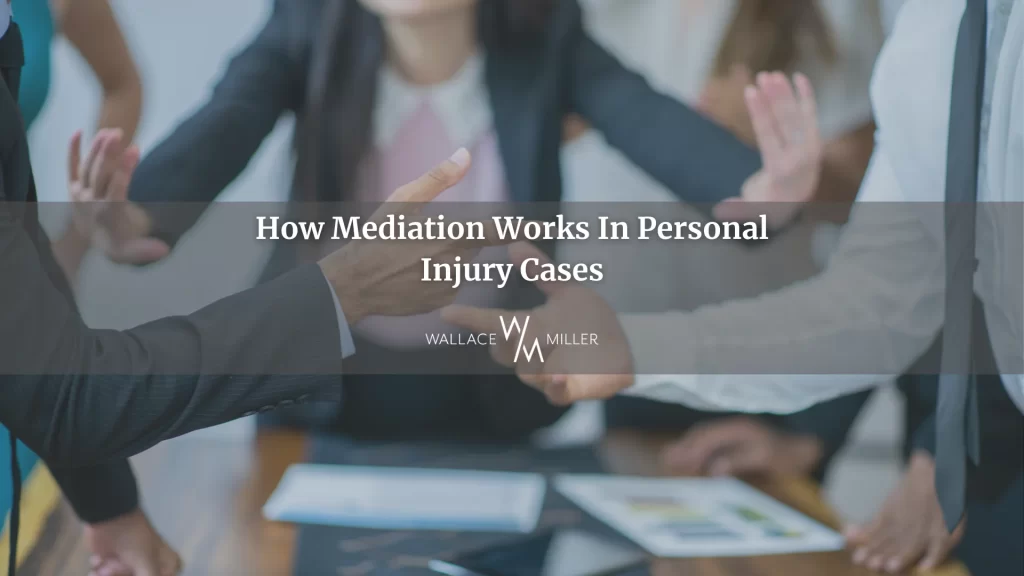Posted on Monday, January 1st, 2024 at 9:00 am

If you’ve sustained injuries due to someone else’s negligence or wrongdoing in Chicago, Illinois, you may be eligible to receive financial compensation. You can seek compensation by filing a claim with the negligent party’s insurance company. Filing a lawsuit to pursue damages in court is another option when the insurance company won’t offer a fair settlement.
The settlement negotiation process can become contentious. Consider mediation before deciding to give up on negotiations and file a lawsuit.
Personal injury mediation is a form of Alternative Dispute Resolution (ADR) that may prove beneficial in these circumstances. Learn how mediation with a personal injury lawyer works to understand why you may consider it. If you are seeking guidance on the settlement negotiation process, consider getting in contact with our team online or calling Wallace Miller at (312) 261-6193.
What Happens During Mediation in a Chicago Personal Injury Case?
According to the American Bar Association (ABA), mediation involves a neutral third party helping parties who are in a dispute come to an agreement. The mediator’s job isn’t to make decisions, although they can make suggestions. In addition, the mediator can’t force the parties to reach an agreement at the end of the process. It is important to know when mediation is legally binding, which is not until an official contact is signed.
In a personal injury mediation session:
- The mediator introduces themselves and the parties involved in the dispute.
- The mediator explains their role and how mediation works.
- All parties sign confidentiality agreements.
- The parties involved in the dispute make opening statements.
- Often, the parties involved in the dispute go into separate rooms after this step.
- The mediator may now go back and forth between the parties to facilitate discussion of key issues.
In the context of personal injury settlement negotiation, the goal of a mediator is to help you and the liable party’s representative agree to a settlement. Once you agree to the terms, the mediator may draft an agreement for all parties to sign.
You are never under any obligation to sign an agreement if you don’t feel the terms are fair, even in court-ordered mediation.
What Are the Benefits of Mediation in Illinois Personal Injury Cases?
Mediation offers many potential benefits when negotiations with the insurance company have stalled. They include:
- Exercising some control over your case’s outcome – Suing a negligent party for damages in court involves some risk. There’s no guarantee a judge or jury will side with you. Mediation gives you an opportunity to work towards an out-of-court settlement. This may be safer than letting a jury decide whether you receive any compensation.
- Saving time and money – Pursuing damages in a trial is a time-consuming process that may involve court filing fees and other expenses. Mediation could allow you to resolve your case more affordably.
- Reducing stress – Although you may have hired a lawyer to represent you, the back-and-forth of negotiations can still cause stress. Effective mediation often results in the negotiation process becoming less stressful for those involved. With a mediator’s help, discussing contentious topics may become easier.
- Ensuring confidentiality – Mediation is a private process. That’s not true of a personal injury trial. If you have any reason to want to keep your case’s details private, mediation allows you to do so.
These are just some of the key benefits mediation offers. If you can’t successfully negotiate with an insurance company on your own, it’s an option to consider.
What Is the Role of a Personal Injury Lawyer in Mediation?
 An attorney can play a variety of roles in mediation. First, if mediation is an option you’re considering, they can help you decide whether to proceed. Next, your attorney can help in preparing for the mediation. Additional ways an attorney may help during personal injury mediation include:
An attorney can play a variety of roles in mediation. First, if mediation is an option you’re considering, they can help you decide whether to proceed. Next, your attorney can help in preparing for the mediation. Additional ways an attorney may help during personal injury mediation include:
- Weighing in on the choice of mediator
- Drafting your opening statement in which you summarize key points of your argument
- Representing you throughout the process, similar to the way they might represent you in court
- Explaining the arguments and points the other party is making
- Helping you weigh the pros and cons of agreeing to certain terms
- Gathering evidence to bolster your argument
A mediator is not supposed to pressure you to sign an agreement. They also aren’t supposed to allow the other party to pressure you. However, if anyone does seem like they’re trying to unfairly influence you during mediation, your lawyer can help you avoid being taken advantage of.
Contact a Chicago, Illinois, Personal Injury Lawyer
Knowing how mediation works can help you better appreciate the way it may help you resolve a case. If your case does go to mediation, a qualified Chicago personal injury attorney at Wallace Miller can help you through the process. Check out our current and past cases to get to know us better.
For more information about what we can do for you, contact us online or call us at (312) 261-6193 for a free case review.
Related Posts:
